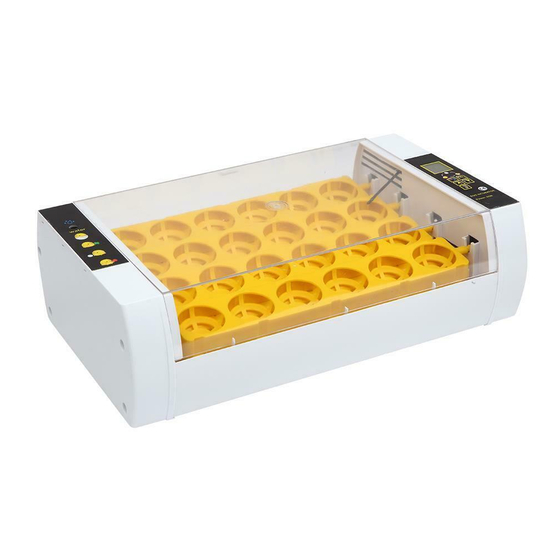- ページ 8
アクセサリー HHD 24SのPDF マニュアルをオンラインで閲覧またはダウンロードできます。HHD 24S 14 ページ。 Automatic mini incubator

The egg provides a complete food store for proper embryo development except
gaseous oxygen, which enters the egg through pores in the shell. Breeding
stock must be fed a well-balanced diet to fully meet the embryos' nutrient
requirements.
The deficient nutrients are usually vitamins or minerals. A deficiency of these
in the breeders' diet may not show any ill effects in the breeders, though
hatchability may be affected, which is why different categories are fed specific
diets. Nutritional deficiencies, such as a lack of riboflavin, are the main causes
of embryo mortality during the middle stage of incubation (i.e. between the
12th and 14th days).
Hens' vitamin and mineral requirements for laying eggs are lower than those of
breeders. The breeder's diet should begin six to eight weeks before hatching eggs
are required, with particular attention to vitamin A, D3, riboflavin, pantothenic
acid, biotin, folic acid, vitamin B12 and the mineral man anese.
Riboflavin
Pantothenic Lowers hatchability and causes a high incidence of
acid
Biotin,
choline
and
manganese
B12
3. Incubation faults and causes checklist
How to locate and recti faults in incubation techni ue
# Problem
Too many
clears or
1
infertile
eggs
Leads to poor hatchability with a high incidence of
malformed embryos, which are excessively moist
apparently normal
embryos to die over the last two or three days of
incubation
Leads to abnormal development of the embryo and
a condition known
as enlarged hock/slipped Achilles tendon
Leads to a rapid decrease in hatchability and a
progressively poorer
survival of chicks that do hatch
Probable causes
(a) Wrong proportion of
males to females
(b) Male is
undernourished
Action
(a) Check mating ratios
according to breeder's
recommendations
(b) See that cockerels
are
able
to
separately,
otherwise
hens ma eat all the feed
feed
